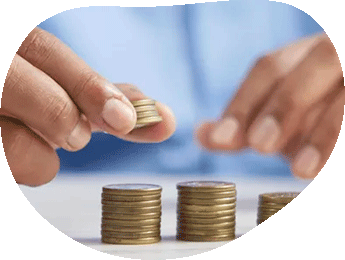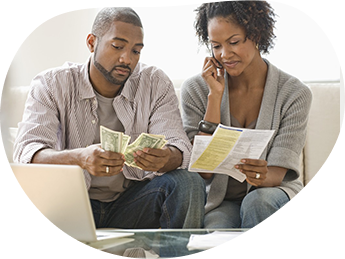Secured Loans vs. Unsecured Loans: What’s the Difference Between Them?

A large number of different loan options can be confusing when you try to choose the right loan offer. Before borrowing money, you should know the difference between secured and unsecured loans to make an informed decision.
Both secured and unsecured loans are types of personal loans. It may seem like the only difference between them is that a secured loan requires collateral while an unsecured loan is available without any pledge. However, this small distinction can change a lot.
Providing a lender with collateral may affect your borrowing limits, repayment terms, credit history requirements, eligibility criteria, and even interest rates. Let’s delve deeper into how a secured vs. unsecured loan works to understand what type of financial products meet your current needs.
Table of Contents
- What is secured debt?
- How do secured loans work
- Types of secured loans
- Where to find secured loans?
- What is unsecured debt?
- How do unsecured loans work?
- What to know about unsecured loans
- Examples of unsecured loans
- Where to find unsecured loans?
- Qualifying for a personal loan
- What should you get: Secured personal loan vs. unsecured personal loan
- Advantages and Disadvantages to Consider: Secured vs. unsecured loans
- Interest rates: Unsecured vs. secured loan
- Bad Credit: Unsecured loan vs. secured loan
- What should you know before you borrow a loan?
- The bottom line
- FAQ’s
What is secured debt?
Secured debt is a type of borrowing you get after providing a lender with collateral. It can be your car, investment account, real estate, the balance of your savings account, or any other valuable property you own. Although applicants risk losing their property in case of missed payments, with collateral, they can get lower interest rates and higher borrowing limits, even for loans with 500s credit scores.

How do secured loans work?
A secured loan is usually easier to qualify for because getting collateral carries less risk to a lender. Although most lenders still check your income and credit report details through major credit bureaus, they will be more tolerant of you even if you have a poor credit history. Your property serves as a debt repayment guarantee.
If we compare a secured loan vs. unsecured loan in terms of average APR, secured debt offers lower interest rates due to less risk for a lender. At the same time, lenders may offer both a fixed and variable interest rate, which means your monthly payments may differ from month to month.
Secured personal loans may also have higher borrowing limits. You must repay your secured debt in equal monthly installments within the repayment period.
Speaking about risks, you will get penalties in case of any problems with your debt payments. You will have to pay late fees, and your credit score will suffer as well. It may be dropped by as many as 100 points even after one missed payment. As secured loans require collateral, personal or online lenders also have an option to repossess your property. Thus, while a secured loan is less risky for lenders, it carries more risks for a borrower.
Types of secured loans
Some secured loans allow you to spend the money you get for almost any purpose. Such loans include:
Secured personal loans Home equity loans Home equity lines of credit Secured business loans Car title loans Pawn shop loans
Thus, using the balance of your investment account, your home, car, or any other valuable property as collateral, you may cover your medical debt, credit card debt, pay for education, renovate your home, or cover any other large expenses and personal needs.
On the other hand, a secured loan may use the property you’ve bought using this loan as a pledge. For example:
Auto loan Mortgage RV loans Powersport loans
Where to find secured loans?
Borrowers may obtain secured personal loans in a bank or credit union. You may also get a secured loan from an online lender. However, not all online lenders offer secured loans, so banks and credit unions are the most popular way of getting secured debt.
Secured personal loans from banks and credit unions typically use the balance of your savings account. The balance will not be available until you pay off your loan.
Online lenders commonly provide vehicle-secured loans. Lenders may also want to appraise the vehicle before lending you money.
What is unsecured debt?
Unsecured debt is a loan type that doesn’t require collateral. That means a lender will make a loan decision relying on your credit score. Although you don’t risk losing your property if anything goes wrong with your loan payments, unsecured debt generally comes with higher interest rates.
How do unsecured loans work?
As an unsecured loan has no collateral backing, a lender has to pay more attention to your credit score and debt-to-income ratio. In most cases, you need to have a good credit score and above-average income to get an unsecured loan at acceptable terms. Some lenders may also check your education and address data before making a decision.
Borrowers with good and excellent credit typically can count on lower interests, while applicants with fair or bad credit may get an offer at higher interest rates. On average, an APR for unsecured loans range from 6% to 36%.
Unsecured loans must be repaid in equal monthly installments. As loan terms may reach 60 months, your unsecured debt cost will be equally divided by the number of months of the repayment period.
If we compare secured and unsecured loans in terms of risks, unsecured personal loans are safer for borrowers. Although any repayment failure will hurt your credit score, there is no risk of losing your property. A lender may allow you to go on a hardship plan to lower or defer your monthly payments. If you have a default between 30 and 90 days of missing, a lender may begin a debt collection process. In the end, the collection process may lead you to court.

What to know about unsecured loans
The main thing you should know about an unsecured loan is that it is typically more expensive because of higher interest rates. An unsecured personal loan also has more eligibility criteria and requirements you must meet to get it.
Although both secured and unsecured debt requires credit checks, lenders pay more attention to your credit score in case of applying for unsecured personal loans. However, there are some unsecured loan options with no hard credit checks and minimum credit score requirements, but they provide an extremely high interest rate and worse conditions.
Examples of unsecured loans
On the one hand, there are unsecured personal loans that consider your or your cosigner’s credit score as one of the determining factors. These loans include:
Personal loans without financial protection Debt consolidation loans Personal lines of credit Credit cards Education loans
On the other hand, there are unsecured loans that allow you to borrow money without performing hard credit checks and taking into account your credit history. These loans typically come with extremely high interest rates. They include:
Payday loans Installment loans
Where to find unsecured loans?
Online lenders may offer you unsecured loans with a convenient online application process along with acceptable rates and terms. You may also apply through a bank or credit union, but there are not many traditional financial institutions offering unsecured loans. You may ask your bank manager about available unsecured options.
Qualifying for a personal loan
There are some common steps you should take before qualifying for a loan, whether you apply for a secured or unsecured one.
- Check your credit history through free services. Your credit still plays a role, even if you apply for a secured loan, so make sure you meet the minimum requirements.
- Compare loan offers from different lenders. Don’t accept the first offer you get. Compare lenders based on rates, terms, and conditions, and choose the product that suits you most.
- Prepare your personal details and documents. Lenders usually require some of your personal data, such as Social Security number, ID, email, mobile phone number, employment and account details, debt information, and proof of your income.
- Apply for a loan. The application process may take place online or in the lender’s store.
- Get a loan decision. Lenders commonly inform applicants by email or by phone.
- Read your loan agreement carefully. Make a double-check and make sure you understand all the terms and they are acceptable for you.
- Accept a loan offer and sign a loan contract. If all the conditions suit you, you must sign a loan agreement to get the money.
- Receive your loan amount. Lenders may deposit money directly to your checking account, send it to you as a check, or send it to a creditor or a dealer.
If you apply for a secured loan, you may also require to provide a lender with some additional information and documents regarding your collateral. Lenders may also want to appraise your property before lending you money.

What should you get: Secured personal loan vs. unsecured personal loan
It’s hard to say which loan type is better because there is no one-stop solution. Borrowers should understand the difference between secured and unsecured loans to make the right and informed decision in accordance with their situation.
Unsecured personal loans can be your best option if you have an excellent or good credit score and your debt-to-income ratio doesn’t exceed 50%. As an unsecured personal loan usually offers pre-qualification that doesn’t affect your credit, it can give you an idea of terms, rates, and monthly payments a lender can offer you before signing a loan agreement.
If your credit is fair or poor, or you just want to save money on interest, you may consider a secured loan, but first, make sure borrowing is worth the risk. The possibility of losing your car or home can increase financial stress.
Some lenders offer personal loans for borrowers with poor credit without any collateral. However, these loans usually come with higher rates and worse conditions.
Summing up, both loan options, whether secured or unsecured, have their advantages and disadvantages. When you choose between secured vs. unsecured loans, pay attention to your credit score, debt-to-income ratio, and the amount you want to borrow. You may also compare the amounts of monthly payments to make sure they suit your budget.
Advantages and Disadvantages to Consider: Secured vs. unsecured loans
Both secured and unsecured debt have their pros and cons. While unsecured loans are less risky and don’t require any pledge, they typically offer higher rates and have strong requirements for your credit report information.
Secured loans have lower rates and may be available for people with poor credit. At the same time, a borrower may lose his collateral in case of missed payments. Secured loans may also require you to provide the lender with some additional documents regarding your collateral.
Interest rates: Unsecured vs. secured loan
Secured debt is commonly cheaper as lenders have less risk because of collateral. Unsecured debt usually has higher interests but carries no risk of losing the property to a borrower. The exact cost of your loan will depend on many factors, including your credit, and may reach 36% APR.
Bad Credit: Unsecured loan vs. secured loan
Applicants with poor credit have fewer chances of getting an unsecured personal loan. As this type of loan doesn’t require collateral, a moneylender will pay attention to your FICO score and may either reject your loan request or offer you high rates. Secured loans are easier to get when having less-than-perfect credit. Although most lenders will still perform hard credit checks, they will be more tolerant due to securing a loan by collateral.
What should you know before you borrow a loan?
Borrowing money should always be an informed decision. Here are some major things you should pay attention to before applying for a secured or unsecured loan.
Improve your credit score before applying
If you find secured loans risky and don’t want to provide a lender with collateral but have some issues with your credit history, consider improving your credit before applying. A person’s credit is a key factor in the qualification process. You may be rejected or get a loan at a higher rate if you try to get an unsecured loan with poor credit.
Choose wisely a direct lender
Compare offers from multiple lenders and choose the best option. Choosing the right lending company may be one of the most important lending decisions. Make sure a moneylender offers you competitive rates and acceptable terms.
Know the repayment terms
This knowledge helps you avoid late payments and fees. It also saves your credit from negative consequences.
The bottom line
Knowing the difference between secured and unsecured loans may help you make the right financial decision and minimize the risk. Although both loan options generally come with hard credit checks, secured debt is usually easier to get with poor credit. It also provides better rates and flexible terms. At the same time, there is always the risk of losing your property in case of payment delays.
Unsecured debt may be a safe option for people with good or excellent credit.
FAQs
Which type of debt should you prioritize paying off first?
Although defaulting on any loan leads to negative consequences, you’d better prioritize paying off a secured loan to save your collateral.
Where can you get help with repayment?
You can consider a debt consolidation loan, ask your loan provider for an alternative arrangement, get credit counseling in a nonprofit organization, or consider some alternative options. It can be debt settlement, debt management plan, or bankruptcy.
What are the risks of unsecured loans?
Although you have no risk of losing your property, defaulting on a loan will hurt your credit score. If you have a default between 30 and 90 days, a loan provider may begin a debt collection process.
Which type of personal loan is best for you: secured or unsecured?
There is no one-stop solution for any occasion. When choosing between secured vs. unsecured loans, consider such factors as your credit, debt-to-income ratio, having an asset to use as a pledge, as well as the amount of monthly payments, interest rates, and loan terms a moneylender offers.
